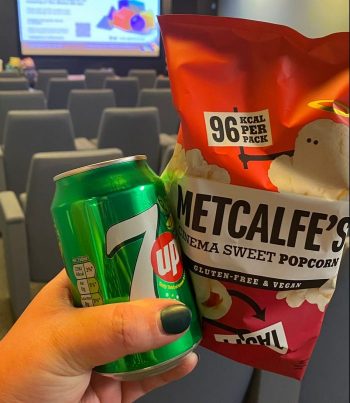
July 4, 2022, by Emma
Student blog: Then Barbara Met Alan screening for Disability Recognition Month
In May, Libraries hosted a film screening of BBC Drama ‘Then Barbara Met Alan’ as part of the University’s Disability Recognition Month. Undergraduate student, Lucy Woodward attended the screening and has shared her experience.
As part of UoN’s Disability Recognition Month, I attended a screening of the 2022 BBC drama ‘Then Barbara Met Alan’ hosted in the Hallward Library Screening Room. I went in with an open mind and the hope that I’d gain a greater understanding of the challenges the disabled community has faced and continues to face. I left with so much more. I felt moved by the sacrifices made by disability activists, disgusted and shocked by the amount of discrimination against disabled people in the early 1990s and immensely grateful for the rights that I too often take for granted.
The film follows the story of two young performers and disability rights activists, Barbara Lisicki and Alan Holdsworth. Their love story is full of mutual understanding, cooperation and acts of service for each other. It’s the kind of romance that is rarely portrayed in mainstream media, the sort of unglamourous love that feels heartfelt and genuine.
Their connection is integral to the plot, since the main narrative follows their campaign for the Disability Discrimination Act, which was eventually passed in 1995. With their shared hope that “we could change the world,” Barbara and Alan set up the Direct Action Network (DAN), which brought together disability activists who shut down inaccessible bus routes, protested against the ITV Telethon with their slogan ‘Piss on Pity’ and brought Westminster to a standstill. The power of collective action is evident throughout.
In the days and weeks after watching When Barbara Met Alan I found myself noticing accessibility everywhere I went. Stairways with no ramps, steps where steps are unnecessary, I became acutely aware of the immense privileges I experience in my usual routes to get around, as well as the way people view me differently as non-disabled person.
One of the most memorable scenes for me was a short conversation between Barbara and her neighbour, who lived above her in their council housing block. Her neighbour was arriving back from hospital after a bad accident, being carried upstairs in her wheelchair by her family members. Barbara points out “She can’t live up there,” to which the neighbour replies; “Better than being stuck in a hospital for three months, […] she doesn’t want the fuss.”
So-called ‘accessible housing’ was inaccessible. So was public transport, and even the basic right to not be discriminated against irrespective of any disabilities. We’ve come along way, thanks to the dedication and vision of activists over the years.
However, in the current political climate of the overturn of Roe vs Wade and the attack on women’s reproductive rights, there’s a terrifying sense of regression. It seems that there is a danger that other hard-fought-for rights may be under threat in months and years to come.
This makes Disability Recognition Month all the more important. Understanding the sacrifices and toil of disability activists to pass the 1995 Disability Discrimination Act and the 2010 Equality Act which replaced it is paramount. Understanding how far we still must go to create a world that’s accessible to everyone, regardless of ability, race, gender or sexuality is even more so.
Take a look back at the events organised by the University of Nottingham during Disability Recognition Month, or sign in to Box of Broadcasts (BoB) via NUsearch to stream When Barbara Met Alan.
No comments yet, fill out a comment to be the first

Leave a Reply